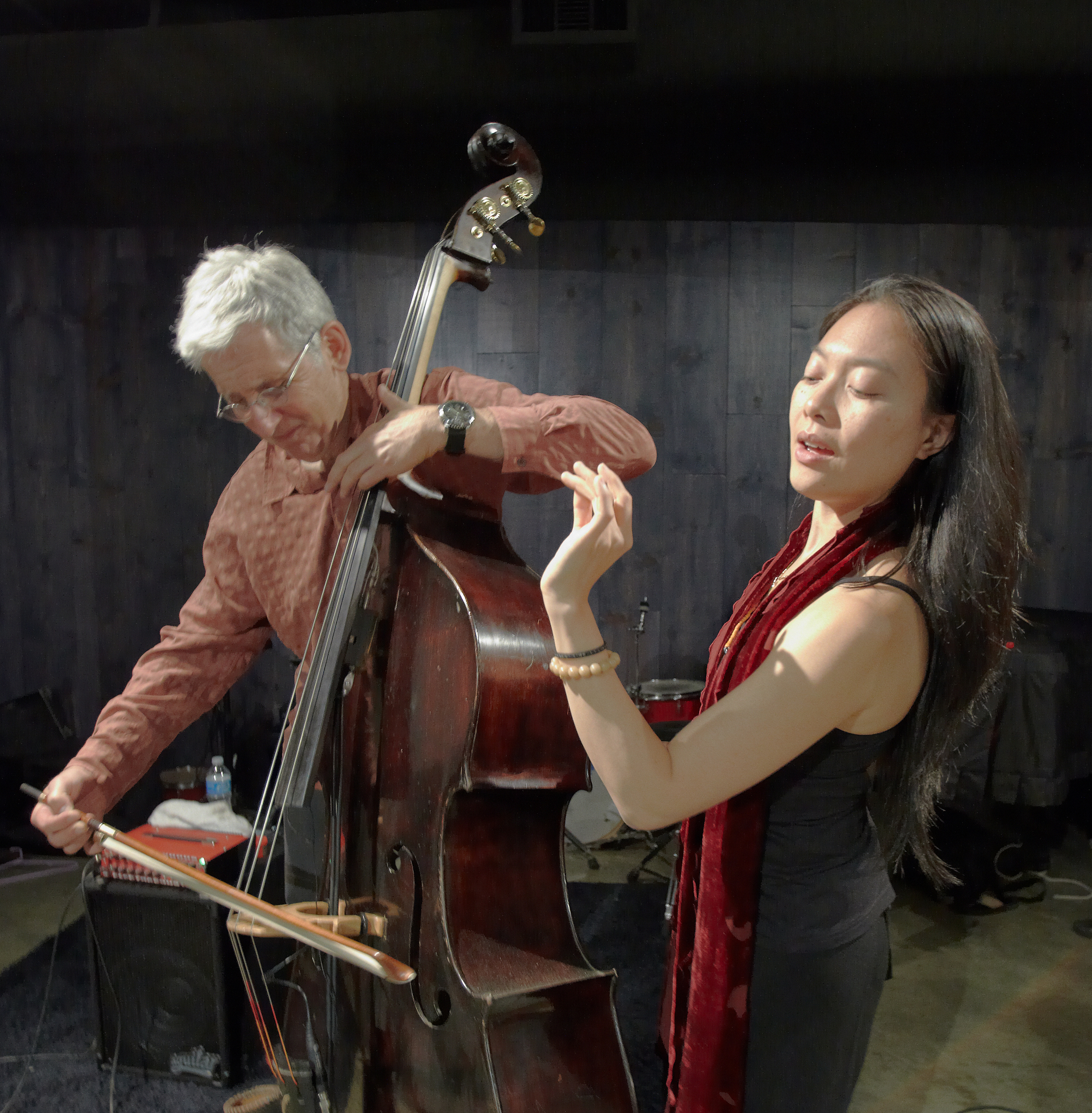
 BY ZIVIT SHLANK For 12 years, Ars Nova Workshop has been presenting live music that is distinctly unique and adventurous, unafraid to challenge their audiences’ perceptions of jazz and beyond. It’s the perfect platform for performing artist Jen Shyu. From her father’s classical music collection and the Broadway show tunes that captivated her as a youth, to her travels to the Far East to learn indigenous styles, her musical journey is certainly unique. Her evocative, multi-faceted, and polylingual styles of voice, composition and movement have been mesmerizing audiences all over the world, stretching the boundaries and redefining what it is to be a jazz musician. Ars Nova is preparing to kick off their 12th Season with a rare appearance by Shyu and bassist Mark Dresser who will perform music from their new CD, Synastry, tonight at the Philadelphia Art Alliance. Phawker recently chatted with Ms. Shyu to dig a little deeper.
BY ZIVIT SHLANK For 12 years, Ars Nova Workshop has been presenting live music that is distinctly unique and adventurous, unafraid to challenge their audiences’ perceptions of jazz and beyond. It’s the perfect platform for performing artist Jen Shyu. From her father’s classical music collection and the Broadway show tunes that captivated her as a youth, to her travels to the Far East to learn indigenous styles, her musical journey is certainly unique. Her evocative, multi-faceted, and polylingual styles of voice, composition and movement have been mesmerizing audiences all over the world, stretching the boundaries and redefining what it is to be a jazz musician. Ars Nova is preparing to kick off their 12th Season with a rare appearance by Shyu and bassist Mark Dresser who will perform music from their new CD, Synastry, tonight at the Philadelphia Art Alliance. Phawker recently chatted with Ms. Shyu to dig a little deeper.
PHAWKER: Congratulations on being the very first female artist to debut as leader for Pi Recordings! What were you both trying to achieve, both sonically and thematically, with your new CD Synastry?
JEN SHYU: Thank you – I first met Mark Dresser in 2006 at a conference of improvised music called ISIM, as Steve Coleman’s band was invited to perform and teach there. I had known of Mark’s work, but had not yet met him in person. I heard him with Myra Melford, and he also heard me with Steve’s band, and when we met, we exchanged info and wanted very much to play music at some point. When he came to NYC to do a gig at Cornelia Street Café with Trio M, we did an improvised session the next day at Cornelia, and that began our collaboration. We started to write compositions for the duo, but it has always been about improvisation and sound and movement (I also dance as well). It’s a very personal project and each of us brings our own personality and deepest interests to the duo. I feel like we each are as invested in sound and time as we are with form and content, so it is a very complete collaboration with endless possibilities.
PHAWKER: You’re very well-versed in many different musical styles, but I’m curious: was there a particular artist, genre or piece that inspired you to pursue music?
JEN SHYU: The first music I was hearing and really listening to was all classical music, starting with my ballet classes at age 5 and my father’s private classical music collection at home. It was dancing in the Nutcracker year after year and playing the role of Clara that initially really inspired me. I remember a recording of David Oistrakh performing Tschaikovsky’s Violin Concerto No. 1 which I used to dance to in the privacy of my room and make up my own fantastical stories to, and later I learned the piece on the violin. Musical theater repertoire is actually what got me singing in the first place at the age of 12, and I began imitating these singers at first, and then discovered jazz singers like Sarah Vaughan and Ella Fitzgerald through these songs, since many standards were originally songs from Broadway musicals. In high school, I also got into Aretha Franklin and Tori Amos, and Charlie Parker with strings when I went to college.
PHAWKER: You first got noticed in the jazz world singing with Steve Coleman and Five Elements. I’ve heard that Steve is a notoriously intense musician to work with. How has your work with him shaped your musical aesthetic?
JEN SHYU: I first met Steve in November of 2002 through a mutual friend of ours, drummer Dafnis Prieto. I was bold and gave Steve my CD For Now, which I had just produced in San Francisco, an album of standards. Steve emailed me the next day, as he was working on his Lucidarium album and looking for vocalists. Though I had little experience in improvisation, he could tell I was hard working and very serious about being more than a “jazz singer.” I went to study with him for 8 days first chance I could. It was an intense time of very little sleep, but it was a natural high to delve into the mystery of improvisation, and I began to catch a glimpse of this mystery that I was so hungry to learn about. He and I sat at the piano, getting me to learn solos by heart and asking why things worked and why these lines that Charlie Parker and Art Tatum played sounded beautiful, and how I could begin to improvise my own lines utilizing those root concepts. The learning curve was steep, and I worked very hard, obsessively, to function as another “instrument” in the band when I joined in 2003, learning all the parts in order to sing the music, and also “catching up” in terms of improvisation. Steve hammered into me the idea that there are no limits to the voice and that there is no reason why vocalists cannot achieve the same complexities that instrumentalists can in terms of concept and technique. Steve’s approach, especially toward rhythm, has influenced me deeply in the way I look at music making now, and certainly that influence is audible and tangible on my first record as a composer and bandleader after moving to New York City, Jade Tongue, and my most recent project Inner Chapters.
PHAWKER: You’ve traveled to many exotic places, from Cuba to Taiwan, conducting fieldwork study to gain an intimate understanding of various indigenous musical styles. How have you incorporated those experiences into your music and the sound you’re trying to convey?
JEN SHYU: I’m trying to be myself actually, but also serve as a vessel for the spirits that inspire me, be it my ancestors or anyone whom I encounter along this path of seeking. I recently visited East Timor, where my mother is originally from, documenting and learning the oldest and most authentic vocal music that still remains in the country. These experiences I cannot help but bring into my work as an artist and human being, and in all my research, I learn the language and bring that into my improvisational palette. When I sing and don’t use words, I am expressing emotions through a mix of these sounds and syllables, creating a language that someone might think is a language, but is actually an organic and improvised mixture of those that I have learned. I do, however, sometimes slip into an actual language; but music itself is the universal language, so the mixture of known spoken languages and music is a powerful one. I feel the unknown is much more affecting than the known because the unknown causes the listener to expand and search rather than to know and close that door to questioning. In terms of traditional musics around the world that I research and whose essence I integrate into my music, I hope that I can shine a light on these under- recognized peoples and their music in the process of creating art inspired by them.
PHAWKER: With regards to tonight’s performance at the Philadelphia Art Alliance, what can a potential audience member expect to see and hear?
JEN SHYU: The audience can expect to be surprised and transported — We are interested in expanding awareness and making the time that we have to share with the audience a transformative experience, and hope that they will be changed from the experience.
JEN SHYU & MARK DRESSER PERFORM TONITE AT THE ARTS ALLIANCE
***
MARK DRESSER + JEN SHYU IMPROVISATION / COMPOSITION WORKSHOP IN PHILADELPHIA
ALL VOCALISTS & INSTRUMENTALISTS WELCOME
Wednesday, September 14, 2011, 2-hour workshop, promptly at 4pm – 6pm
Fee: $20 / person
Location: HIGHWIRE GALLERY, 2040 Frankford Ave, corner of Susquehanna
Philadelphia, PA 19125
www.highwiregallery.com
**Walk-ins to the workshop are welcome, but please email Jen at jen1@jenshyu.com so we have an idea of how many to expect and also to coordinate equipment that musicians need to bring as the space has no piano, amps, or drums***
